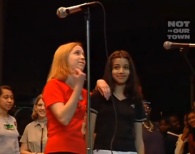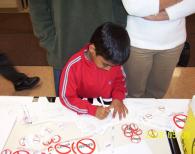By Blair Campbell
If you are concerned that your child is at risk for being a victim of cyberbullying, you can take proactive steps and intervene before things get out of hand. The way you and your child respond may even help break the cycle of bullying in your community.
Prohibiting your kids from participating online is not a solution. It doesn’t work—they’ll just find a way to do it out of your presence and will not feel comfortable communicating with or confiding in you if they run into a problem. Rather, you need to strike a balance between policing their activity and offering them constructive guidance. Here are some positive ways you can talk to your kids about and work with them to prevent cyberbullying:
schools

On this third day of No Name-Calling Week, we showcase two videos of middle school students who use skits to stand up against bullying and promote acceptance in their schools. The first is a Not In Our Town video from Rockford, Illinois where student council members organized a Not In Our School campaign and a school wide assembly with student-produced skits challenging stereotypes and other intolerant behavior.
Like the students at West Middle School, these students from Tom Harpool Middle School in Argyle, Texas created this video to stand up against bullying as a part of their Destination Imagination program.

The message of NIOT is Reaching the Classrooms and Schools of Bloomington-Normal, IL By Marc Miller, NIOT Bloomington-Normal Member
It’s parent night at at the neighborhood elementary school. Children, their parents in tow, rush from room to room, excited to show off their drawings and projects. Parents, anxious to know more about their children’s progress, take in the posters and decorations as they move from class to class. But for some, a simple table in the corridor attracts their attention. The banner draped over it says: Take a Stand Against Racism! Sign The Pledge.
“What’s this?” says a student, and a table volunteer cheerfully describes the Not In Our Town program. There are No Racism stickers for notebooks and lockers; larger stickers for bumpers and windows; even temporary tatoos. For parents, there are refrigerator cards with talking points defining common terms: predjudice, stereotype, discrimination; and a simpler set of talking points aimed at the primary grades.
